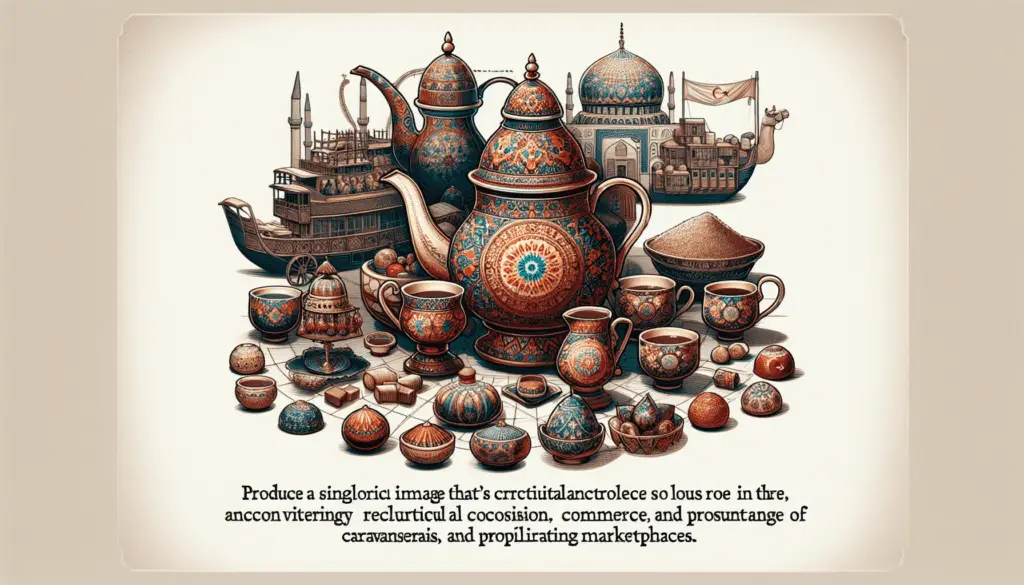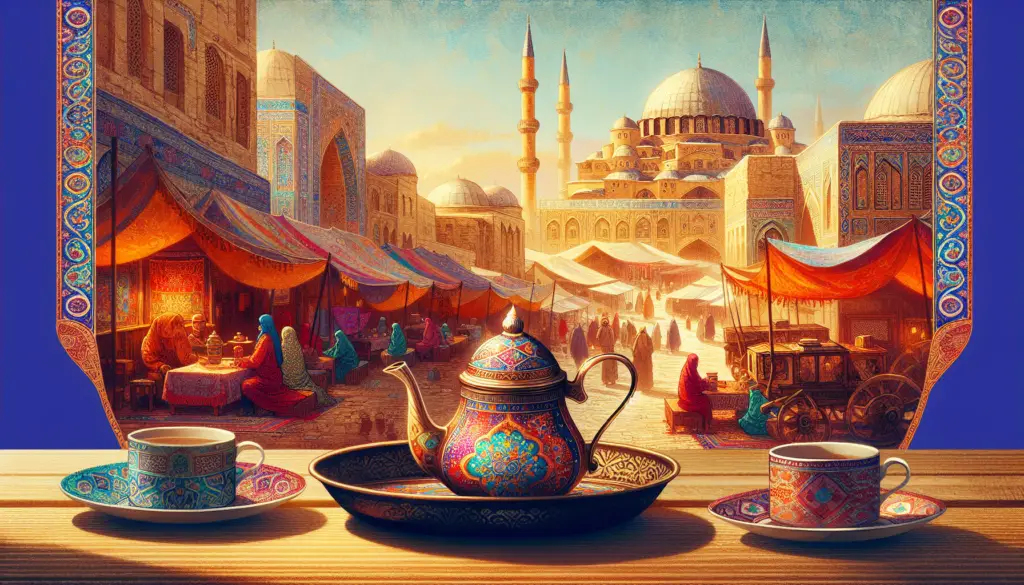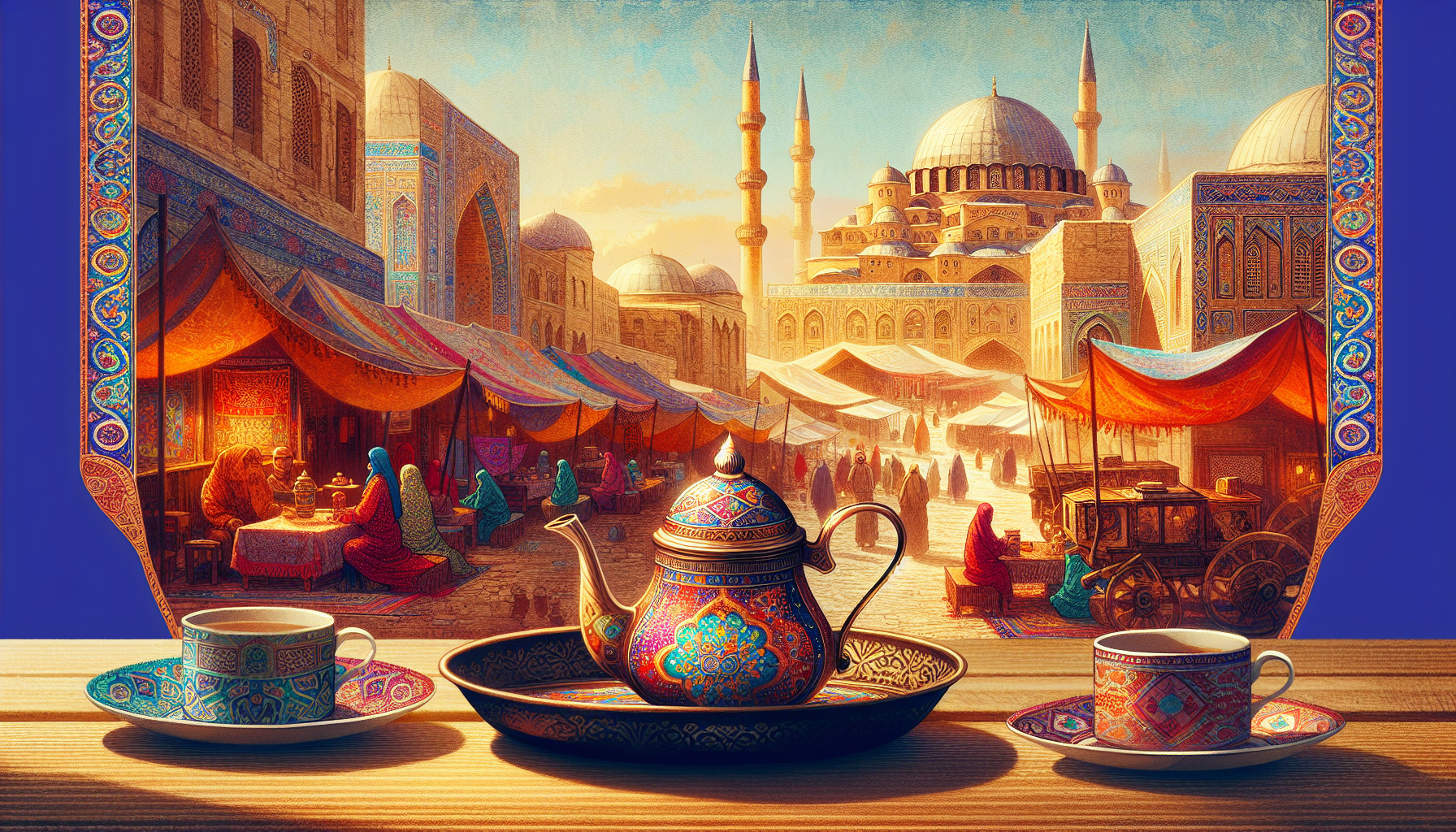Imagine stepping back in time to the glorious days of the ancient Silk Road, a network of trade routes connecting East and West. In this captivating article, we will explore Turkey’s fascinating role in this historical masterpiece. From its strategic location bridging Europe and Asia to its rich cultural heritage, Turkey played a pivotal role in the Silk Road’s development, serving as a crossroads for commerce, ideas, and cultural exchange. Get ready to embark on a journey that uncovers Turkey’s hidden treasures and its enduring impact on the Silk Road.
Historical Background
Ancient Trade Routes
The history of trade routes in the region that is now Turkey dates back thousands of years. The ancient trade routes passing through this land have connected East and West, facilitating the exchange of goods, ideas, and cultures. These routes played a vital role in the development of civilizations, allowing the flow of goods such as spices, textiles, and precious metals between different regions.
The Silk Road
The Silk Road, arguably the most famous trade route in history, was a network of routes connecting Asia with Europe. It spanned over 4,000 miles and was established during China’s Han Dynasty. Turkey’s unique geographical position served as a crucial crossroad on the Silk Road, making it a hub for trade and cultural exchange between the East and the West.
Turkey’s Geographical Location
Turkey’s strategic location at the crossroads of Europe and Asia has been a significant factor in its historical importance. It bridges the continents of Europe and Asia, connecting the Black Sea to the Mediterranean and the Aegean Sea. The country’s diverse topography, which includes mountains, plateaus, and fertile plains, has made it an attractive route for trade throughout history.
Turkey’s Connection to the Silk Road
Turkey’s connection to the Silk Road was not only geographical but also cultural and historical. As a vital link between the East and the West, Turkey played a crucial role as a trading center and gateway for goods and ideas. Merchants from all over the world passed through its cities, bringing silk, spices, ceramics, and other valuable goods. This connection enriched Turkish culture and influenced its architecture, art, and cuisine.
Cultural Exchange
Influence of Silk Road on Turkish Culture
The Silk Road had a profound impact on Turkish culture, shaping it into a unique blend of eastern and western influences. The exchange of ideas, languages, and traditions along the Silk Road contributed to the richness and diversity of Turkish culture. Turkish cuisine, for example, features spices and flavors that were originally introduced through trade routes. Traditional music, dance, and storytelling also bear the marks of cultural exchange along this ancient route.
Spread of Religion and Ideas
Religion and philosophy were significant aspects of the cultural exchange along the Silk Road. As trade routes facilitated communication between different cultures, religions such as Buddhism, Christianity, and Islam spread across Turkey. Ideas and knowledge in various fields, including science, medicine, and literature, were also exchanged, leading to advancements and the sharing of intellectual resources.
Architectural and Artistic Influence
The influence of the Silk Road can be seen in the architectural styles and artistic traditions of Turkey. The synthesis of different cultural elements is evident in the diverse range of architectural structures, from Byzantine churches to Ottoman mosques. The intricate designs of carpets, pottery, and metalwork also showcase the fusion of artistic techniques and motifs from different regions connected by the Silk Road.

Economic Importance
Traditional Trade Routes
Turkey’s historical significance as a trade hub is rooted in its connection to the traditional trade routes. The Silk Road, along with other trade routes, allowed traders to transport goods from Asia to Europe and vice versa. This trade not only brought prosperity to the region but also encouraged the growth of cities and the development of trade networks, contributing to economic growth and cultural exchange.
Modern Trade Relations
Turkey’s role as a trading nation continues to thrive in the modern era. The country has established strong trade relations with various countries, both in the East and the West. It has diversified its trade portfolio and become a significant player in sectors such as automotive, textiles, and construction. Its strategic location and logistical capabilities make it an attractive trading partner for both neighboring countries and global markets.
Infrastructure Development
In recent years, Turkey has invested heavily in infrastructure development to facilitate trade and transportation. The construction of modern highways, railways, and ports has improved connectivity within the country and enhanced its position as a regional trade hub. The development of logistic centers and industrial zones has also provided the necessary infrastructure for efficient trade and manufacturing.
Trade Agreements
Turkey’s participation in trade agreements has further strengthened its economic ties with other countries along the Silk Road. The country is a member of organizations such as the World Trade Organization (WTO) and the Economic Cooperation Organization (ECO), which aim to foster economic cooperation and facilitate trade among member countries. These agreements have contributed to the growth of Turkey’s export and import markets, promoting economic integration and cooperation.
Tourism and Heritage
Historical Sites along the Silk Road
Turkey is home to numerous historical sites along the Silk Road, attracting tourists from all over the world. Cities such as Istanbul, Ephesus, and Cappadocia boast rich historical and architectural heritage, offering visitors a glimpse into the region’s vibrant past. The ancient trade routes and their interconnected cities, like Troy and Pergamon, are a testament to centuries of cultural exchange and trade.
Promotion of Silk Road Tourism
In recent years, Turkey has been actively promoting Silk Road tourism, aiming to attract tourists interested in exploring the historical and cultural significance of this ancient trading route. Several initiatives have been launched, including the development of themed tourist routes, the establishment of Silk Road museums, and the organization of cultural events and festivals. These efforts not only boost tourism but also contribute to the preservation and promotion of Turkey’s cultural heritage.
Preservation of Cultural Heritage
Turkey recognizes the value of preserving its cultural heritage along the Silk Road. The country has invested in the restoration and conservation of historic sites, ensuring that they are protected for future generations to appreciate. Efforts are also being made to document and research the cultural significance of these sites, promoting academic studies and supporting archaeological excavations. By preserving its cultural heritage, Turkey showcases its rich history and encourages cultural understanding and appreciation.

Turkish Handicrafts and Products
Silk Production and Textile Industry
Turkey has a long-standing tradition of silk production and is known for its high-quality silk textiles. Silk production dates back to ancient times, and Turkey’s expertise in silk farming, spinning, and weaving has been passed down through generations. The country’s textile industry, which includes silk production, is a significant contributor to its economy and serves as a testament to the historical importance of silk along the Silk Road.
Carpets and Rugs
Turkish carpets and rugs are renowned worldwide for their intricate designs and craftsmanship. This traditional art form has deep historical roots, with carpet weaving being an integral part of Turkish culture. The popularity of Turkish carpets along the Silk Road led to their widespread trade and appreciation in different regions. Today, Turkish carpets are still sought after for their exceptional quality and artistic value.
Metalwork and Pottery
Metalwork and pottery are other notable Turkish handicrafts that have evolved through cultural exchange along the Silk Road. The skills and techniques of Turkish metalworkers and potters have been influenced by various civilizations and cultures, resulting in unique and exquisite works of art. From handmade copper vessels to beautifully glazed ceramics, Turkish metalwork and pottery reflect the country’s artistic heritage and continue to be highly valued worldwide.
Bilateral Relations
Silk Road Diplomacy
Turkey’s historical association with the Silk Road has shaped its diplomatic relations with countries along this ancient trading route. The shared history and cultural connections have provided a solid foundation for diplomatic collaboration and cultural exchange. Turkey has actively engaged in Silk Road diplomacy, strengthening ties with countries such as China, Iran, and Central Asian nations through various bilateral agreements and initiatives.
Collaboration with Asian Countries
Turkey has deepened its collaboration with Asian countries, especially those involved in the Silk Road. It has pursued trade agreements, cultural exchanges, and investment partnerships with countries such as China, Kazakhstan, and Uzbekistan. These collaborations aim to foster economic growth, promote cultural understanding, and enhance cooperation in various fields, ranging from tourism to technology.
Participation in International Forums
Turkey’s engagement in international forums related to the Silk Road reinforces its commitment to regional cooperation and global connectivity. The country actively participates in organizations such as the Belt and Road Initiative (BRI) and the Silk Road Economic Belt and the 21st Century Maritime Silk Road. These forums provide platforms for dialogue, cooperation, and the exchange of ideas related to trade, infrastructure, and cultural exchange along the Silk Road.
Transportation and Logistics
Strategic Location for Trade Routes
Turkey’s strategic location between Europe and Asia positions it as a vital transportation hub. Its well-developed transportation infrastructure, including highways, railways, and ports, makes it an ideal transshipment point for goods passing through the region. Turkey’s geographical advantage, combined with its logistical capabilities, enables efficient and cost-effective transportation of goods, thereby stimulating trade and economic growth.
Development of Ports and Airports
Turkey has invested in the development and modernization of its ports and airports to support increased trade and connectivity. The country’s ports, such as Istanbul Port and Izmir Port, play a vital role in facilitating the import and export of goods along the Silk Road. Additionally, Turkey’s airports, including Istanbul Airport and Ataturk Airport, serve as major aviation hubs, connecting Turkey with the world and supporting the movement of passengers and cargo.
Transport Infrastructure Projects
Turkey’s commitment to improving its transport infrastructure is demonstrated through various ongoing projects. Infrastructure development initiatives, such as the construction of new highways, railway lines, and logistics centers, aim to enhance connectivity within the country and strengthen its position as a transportation hub. These projects not only benefit Turkey but also contribute to the overall development of trade and connectivity along the Silk Road.
Energy and Resource Corridors
Energy Security in the Region
Turkey’s role in the Silk Road extends beyond trade and cultural exchange to include energy security in the region. The country is strategically located between oil-rich Middle Eastern countries and energy consumers in Europe. Turkey plays a significant role in ensuring the flow of energy resources through the construction and management of pipelines, contributing to regional stability and economic development.
Oil and Gas Pipelines
Turkey serves as a crucial transit country for oil and gas pipelines, connecting producers in the Middle East and Central Asia with consumers in Europe. The Baku-Tbilisi-Ceyhan oil pipeline and the Trans-Anatolian Natural Gas Pipeline (TANAP) are key infrastructure projects that enhance energy security and diversify energy supply routes. These pipelines reinforce Turkey’s position as an energy hub along the Silk Road, facilitating the transportation and trade of vital energy resources.
Resource Extraction and Trade
Turkey’s involvement in resource extraction and trade contributes to the economic development of the region. The country has a rich abundance of natural resources, including metals, minerals, and agricultural products. The extraction and trade of these resources, alongside other commodities along the Silk Road, further strengthen Turkey’s economic ties with its neighbors and trading partners, encouraging mutual cooperation and prosperity.
Cultural Festivals and Events
Silk Road Festivals and Exhibitions
Silk Road festivals and exhibitions have become increasingly popular in Turkey, celebrating the historical significance and cultural diversity of this ancient trade route. These events showcase traditional music, dance performances, handicrafts, and culinary delights from different Silk Road countries. Silk Road festivals provide a unique platform for cultural exchange and foster a deeper understanding and appreciation of the shared heritage among participating nations.
Traditional Music and Dance Performances
Traditional music and dance play an essential role in cultural festivals along the Silk Road in Turkey. Performances featuring traditional instruments, such as the saz and the ney, accompanied by captivating dance routines, demonstrate the diversity and richness of the region’s artistic traditions. These cultural performances not only entertain and engage audiences but also serve as a means of preserving and promoting traditional arts and cultures.
Art and Craft Fairs
Art and craft fairs bring together artisans and craftsmen from different Silk Road countries to showcase their unique creations. These fairs present a wide variety of traditional handicrafts, including carpets, ceramics, textiles, and metalwork, which allow visitors to appreciate the intricate craftsmanship and cultural significance of these art forms. Art and craft fairs provide economic opportunities for artisans and help sustain traditional crafts along the Silk Road.
Academic Studies and Research
Scholarly Research on the Silk Road
Turkey has been a focal point for scholarly research on the Silk Road. Universities and research institutions in the country conduct studies on various aspects of the Silk Road, including its historical, cultural, economic, and environmental dimensions. These academic endeavors contribute to a deeper understanding of the Silk Road’s impact on Turkish society and shed light on the broader legacy of this ancient trade route.
Collaborative Studies with International Institutions
Turkey actively collaborates with international institutions and scholars to conduct research and exchange knowledge on the Silk Road. Research partnerships and joint projects provide opportunities for intellectual cooperation and interdisciplinary studies. These collaborations promote a global perspective on the Silk Road, fostering international dialogue and engagement in understanding and preserving this important part of world heritage.
Archaeological Excavations and Discoveries
Turkey’s rich historical legacy along the Silk Road continues to be uncovered through archaeological excavations and discoveries. These expeditions shed light on ancient trading centers, caravan routes, and cities that flourished during the Silk Road era. The findings not only reveal the material culture of the past but also contribute to our understanding of the economic, social, and cultural dynamics of the Silk Road. Archaeological research plays a crucial role in expanding historical knowledge and preserving the heritage of the Silk Road.

